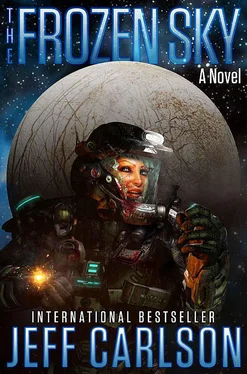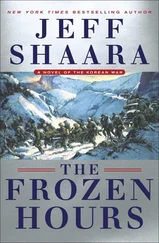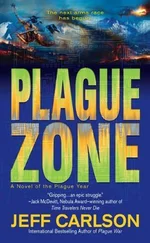Then she got mad. Why is he smiling ? she thought. Is he deliberately trying to weaken me ? She was the loudest proponent of treating the sunfish like equals. If he dominated her, he might win this argument.
“Finely-developed sensory inputs are what elevated the sunfish to sentience,” she said.
“On the contrary,” Dawson said. “They no longer have enough mass left for higher thinking. Certainly they don’t have the emotional quotient we do. They might be smart like our spies are smart — like termites or bees or prairie dogs. They’re able to build structures in a step-by-step manner as a group, but without real initiative or independence. Too much of their capacity is dedicated to pure survival.”
“I disagree,” Metzler said. “They have spindle cells like human beings and the great apes.”
“Dolphins, elephants, and giraffes have spindle cells in similar concentrations,” Dawson said. “No one considers giraffes intelligent.”
Vonnie glanced at Metzler, who said, “Spindle cells are neurons without extensive branching, sort of like free-floating processors. They play a crucial role in the development of cognition and decision-making.” He turned back to Dawson. “Sunfish brains are also more convoluted than ours, and they have faster brain stem transmission times.”
“So do rats,” Dawson said. “Their brain stem transmission time is an adaptation to living in eternal darkness, not evidence of superhuman thinking. That their brain mass ratio is greater than ours also means nothing. It’s a necessary result of their hemispheric asymmetry during sleep.”
“They don’t sleep.”
“They do, Dr. Metzler.” Dawson opened a series of medical imaging scans of the sunfish. He turned to Vonnie and said, “In addition to motor function, most of any creature’s brain is dedicated to involuntary functions such as heartbeat, digestion, and respiration. In sunfish, breathing is voluntary. They must decide to inhale or use their gills or hold their breath.” He looked at Metzler. “We’ve recorded EEG patterns which very much resemble REM activity, but only in one hemisphere at a time.”
“Then they’re technically awake.”
“Indeed. Because the sunfish are voluntary breathers, they would asphyxiate as soon as they relaxed and failed to breathe. They must also remain vigilant for predators. Therefore it’s uncommon that both of their hemispheres are simultaneously awake. In essence, they have two small brains, not a single large one. They alternate between which small brain they use throughout the day.”
Enough , Vonnie thought.
“Their carvings talk about the future and the past,” she said. “They had laws. Some of it looks like philosophy! At the very least, there was tribal rule, and a warlord strong enough to form an empire.”
“It’s interesting that their carvings invariably show perfect sunfish,” Pärnits added. “They never exhibit wounds or age. That suggests a desire for beauty.”
“We’ve dated the youngest carvings at nine thousand years,” Dawson said. “Something happened between now and then. Perhaps the sunfish didn’t always have such dependence on dual forms of sonar or their bioelectric sensing organs.”
“You think they evolved away from sentience?” Pärnits asked. “That would be unprecedented.”
“Everything in this world is unprecedented,” Dawson said.
“Nine thousand years is too quick,” Metzler said. “It’s not enough time for the sunfish to degenerate without an outside cause like massive radiation, and they don’t have the resources or the technology for a nuclear war.”
“Nothing so dramatic is necessary,” Dawson said. “Jupiter’s magnetic field is, in essence, a gigantic particle accelerator. It blasts Europa’s surface with octillions of high-speed ions and electrons every hour.”
“They don’t live on the surface,” Vonnie said. “They’re safe inside the ice.”
“No. The ice shields them from the primary radiation, but there are elements dissolved in the ice like iodine and potassium. When those elements are bombarded, they turn into short-period isotopes, which are sinister little poisons. Churn brings the hazardous material down into the ice. Periods of violent churn exacerbate the contamination.”
“It’s still too fast,” Vonnie said, running a calculation in her head. If the lifespan of a sunfish was twenty years… “It’s only been five hundred generations since they were writing.”
“I’m afraid it’s more than that,” Dawson said. “Male sunfish don’t mature until six years of age. Until then, they may be expendable, leaving only the hardiest to procreate. But their females reach adolescence at two years. They’re fertile at three. It’s been four thousand generations since the carvings.”
“Where’s the evolutionary pressure to give up their intelligence?” Metzler said. “Sentience is the greatest weapon any species can develop.”
“Not necessarily. As nourishment became more difficult to find, they grew more instinctive — more aware in other ways — trading their intelligence for improved sonar and detection. It all fits. We know they’re severely limited genetically. There’s been inbreeding. Unfavorable mutations took hold because those adaptations serve them well. They don’t need intelligence to roam the ice. In fact, their self-awareness worked against them, making them all too conscious of what they’d lost in the turmoil of Europa’s crust. They suffer less without their intelligence, and we should feel lucky indeed at this twist of fate.”
“What do you mean?” Koebsch said.
“Our ancestors had scarcely invented the most primitive forms of agriculture and herding when the sunfish began their decline. Their empire fell. Then they regressed. Otherwise they might have traveled to our world before we visited theirs.”
“Imagine if a superior race had landed among us when we were tribal nomads without science, only fire and spears,” Dawson said. “That’s why the sunfish run away. That’s why they fight us even though they’re impossibly outmatched.”
Silence filled the group feed. Brooding, Vonnie saw troubled looks in her crew mates.
The far-away feeling she’d experienced weeks ago when the Chinese rover discovered the first carvings was with her again now, richer and more poignant.
How close did we come to exchanging destinies with the sunfish ? she thought. If there had been more supervolcanoes on Earth… If another meteor strike like the one that killed the dinosaurs had pushed us to the brink while the sunfish were given another 10,000 years of peace… What if they’d discovered iron and steam power, then steel, electronics, and finally the atom? We might have been a few starving bands of cavemen when they brought spacecraft to Earth.
“I have to admit I’m disappointed in how the sunfish have responded,” Koebsch said.
“Sir, we’ve only been here for six weeks,” Metzler said. “I know you’re under a lot of scrutiny from Berlin, but I think we’ve made inroads.”
“Really?” Dawson said. “All I’ve noticed are the same attacks on our mecha.”
“He’s right,” Koebsch said.
“We should capture some of them,” Dawson said, and Vonnie exploded: “You son of a bitch! People stopped hunting whales because they’re too close to sentience to treat like cows or sheep. Even if you’re right about the sunfish, the same principle applies here.”
“I don’t want to eat them,” Dawson said with his elfin smile.
“But you want to take them apart! Who have you been talking to? Is there a gene corp offering you money or a job?”
“That’s offensive.”
Читать дальше












